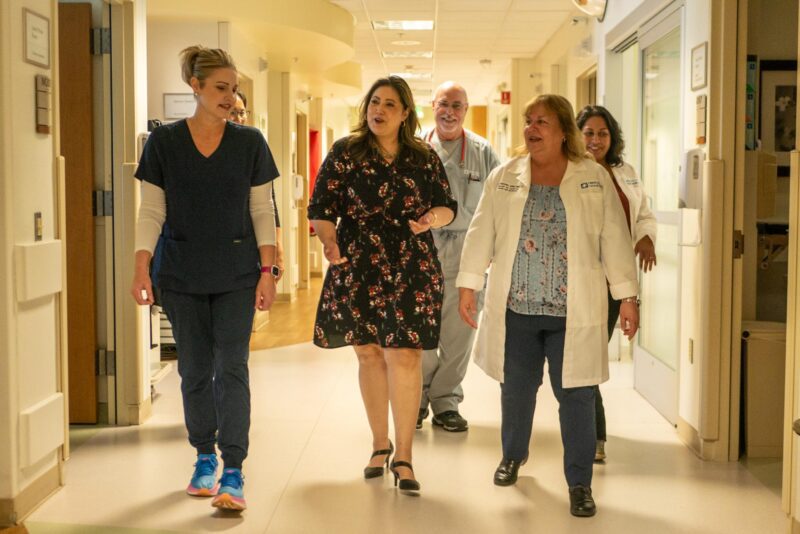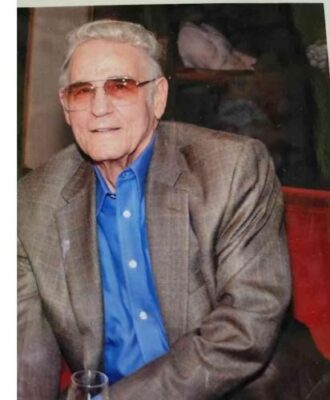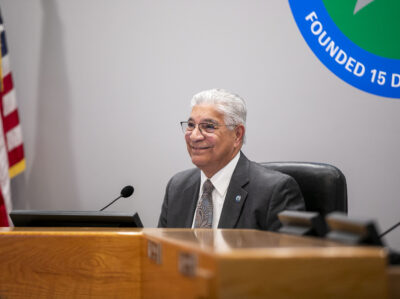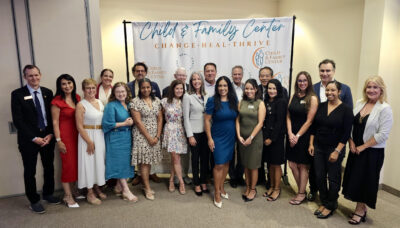Before Henry Mayo Newhall Hospital got its neonatal intensive care unit, a baby born prematurely or with some other serious issue would’ve been taken from the mother and transferred to a hospital with a NICU. That was the case with Kim and Steven Ullman in 2009 when their newborn grandchild needed intensive care.
The Kim and Steven Ullman Neonatal Intensive Care Unit at Henry Mayo, which opened in June 2012, is the result of the Ullmans’ donation and their desire to prevent what happened to them from happening to other families at the hospital.
“It’s really about keeping the mom and the baby there,” said Renée León, Henry Mayo Newhall Hospital Foundation manager. “Imagine if you’re a grandparent. Like, my mom, she still says to this day, ‘You’re my baby. Where do I go? Do I go with the babies, or do I stay with you?’ And my husband. How would he be? Does he stay with his wife? I just did a major surgery. Or does he go with the kid?”

León said she couldn’t imagine what the Ullmans and other families in similar circumstances went through. León had twin sons who were two of the first newborn babies to have gone through the Henry Mayo NICU. León, like her mom, still wonders what it would’ve been like if Henry Mayo didn’t have a NICU and her babies were transported to another hospital.
León’s story, she said, is serendipitous. Before she had her kids, she came to work at Henry Mayo to raise money for the NICU project. Little did she know she’d become pregnant with what she called a rare type of twins called monoamniotic-monochorionic twins, in which identical twins share both the amniotic sac and the same placenta.
“So, there are two babies receiving the same nourishment,” she said. “The cords could be tangled, and they only have a 50% chance of survival. It wasn’t like I had the baby and then something happened. I actually got to choose where I had my babies, and I chose Henry Mayo because they were just building out a strong NICU. They had amazing staff. They had the latest technology. They had these beautiful private rooms where I could have both boys in the same room.”

León was emotional when recounting her story. All the things she’d said and done to help raise funding for the NICU were all the things that, she said, eventually saved her family. She knew what Henry Mayo was building, adding that the hospital’s NICU was going to be the best of the best.
“They (Henry Mayo) came through more than you would ever believe,” she said. “I’m indebted to them, and that’s why I’ve remained here for 14 years. I’m so passionate about health care in this community because I not only see how it can transform lives, but how it can really be a part of your life and a great part. Henry Mayo has given me and my boys a chance just for that.”

The Kim and Steven Ullman NICU is an 11-bed specialty unit for the most fragile infants, including premature babies and other babies who have critical health conditions.
According to the Henry Mayo website, the unit’s multidisciplinary team of neonatologists, neonatal nurses, respiratory therapists and others offer expertise and special equipment to help delicate newborns overcome a variety of health issues, including breathing problems, high blood pressure, pneumonia, heart abnormalities, blood sugar problems, gastrointestinal issues, serious infections and other ailments requiring advanced medical care.

Patrick Moody, Henry Mayo’s director of marketing and public relations, said that since the NICU opened in 2012, they’ve cared for more than 1,800 babies.
Lori Matzner, Henry Mayo director of maternal and child health services, said the NICU has cared for babies born as early as 23 weeks.
“We provide them the care they need to be able to basically grow and thrive — until they’re ready to discharge,” she said. “Sometimes that could be staying in a hospital 135 days. Whatever their due date was is usually the time frame we anticipate that they’ll probably be in a NICU. So, if they’re delivered at 23 weeks, then that’s 17 weeks of living in our NICU. Because babies, when they’re that little, they can’t breathe very well on their own. They can’t eat on their own. There are milestones that babies have as they mature inside a mom that allows them to be ready to come into the world at 40 weeks.”
Matzner spoke about some of the features of the Kim and Steven Ullman NICU. All the rooms for patients are private, and two of the rooms are set up for twins or triplets.
Then there’s something called a Giraffe OmniBed, which is a combination system that combines a traditional incubator and radiant warmer, providing support for babies in their most delicate stages.

“We don’t want to have to use it, but we also have something called the Arctic Sun,” Matzner said. “It’s for when there’s something that’s going on with the baby and you want to keep the baby’s temperature regulated in a way that keeps the brain healthier. It’s really hypothermia management.”
Asked about success stories that stand out to her, Matzner brought up a case that began in November 2023.
Claire Lutz, a 36-year-old Philadelphia woman who was 24 weeks pregnant at the time, was on vacation at Vasquez Rocks in Agua Dulce with her husband and some friends when her water broke. She was 2,500-plus miles from home.
A little over 30 minutes later, Lutz checked into the emergency room at Henry Mayo, and seven days after that, Lutz and her husband welcomed a baby boy into the world. The couple named their child Rocky after the rocky Vasquez Rocks where it all began, and not after, Lutz insisted, their own Philadelphia fictional Rocky Balboa from the 1976 Sylvester Stallone movie “Rocky,” and certainly not after the rocky delivery.
Rocky was 1 pound, 14 ounces when he was born.

“Babies born at 24 weeks — a lot of them don’t survive or they have major, major complications,” said Emily Lloyd, a registered nurse in the Henry Mayo NICU. Lloyd worked with Rocky when he was there and spoke with The Signal for a previous story about the case. “This little guy got through his whole hospital course. He did so amazing. Such a tiny percentage of babies do that well.”
Rocky stayed at the NICU until his previously expected due date. His mom and dad rented a room in a house across the street from the hospital so that they could visit him once or twice a day.
When Rocky was discharged, getting back to Philadelphia became yet another ordeal. Rocky needed oxygen during the flight home, but they faced insurance issues related to getting a machine that could travel with the family across the country.
According to Lloyd, case managers, charge nurses, a social worker, doctors and the NICU director were all working hard to find a solution. They found one and the family made it home safely.
In a June 2024 email to Henry Mayo, Lutz updated NICU staff members who provided care: “Rocky has been adjusting and doing really well. All of his doctors have been so impressed with his status. One even asked us, ‘Do they do things differently in California?’ He was cleared for ROP (retinopathy of prematurity, an eye disease sometimes found in premature babies) and got a clean bill of health from the cardiologist as well, so we are now just working on weaning his oxygen. If that continues to go well, he should be off in two to three weeks.”

Matzner said it was all quite the production and a collaborative effort that ended with big successes for the family and for the NICU.
“I don’t even think a lot of people know we have a NICU here,” she added. “I think they don’t realize that we provide the service to the community.”
As for León and her twins, Gavin and Gabriel León are among what León called the first graduating class of the NICU. Now 12 years old, the two brothers will be graduating sixth grade next month from Emblem Academy in Saugus.
“It’s a big deal,” the proud mother said of the NICU and its team. “I know for every parent it’s a big deal, but at the time — at that point in your life — you weren’t sure if you’d ever have any of these moments. It’s really all because of them.”









